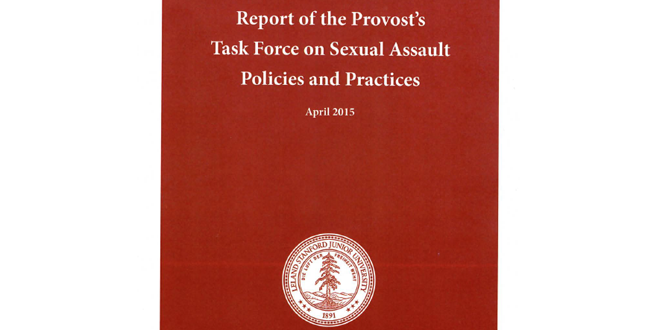When The Daily Editorial Board decided to address the report of the Provost’s Task Force on Sexual Assault Policies and Practices, this was not the article we intended to write.
We were prepared to decry the task force’s recommendation to bar undergraduates from serving on the three-person adjudication panels, ready to question the report’s ambiguity on the role of graduate students in hearings, willing to declare that these recommendations would fall short in producing the desired outcome: more reported sexual assaults.
But do we really know? Can we confidently assert, for example, that having undergraduates serve on these panels will dissuade victims from bringing their cases forward?
The difficulty of answering this question, amongst other dilemmas, without ultimately falling back on gut feelings and intuition is precisely the problem that the 18-member task force, chaired by Dean M. Elizabeth Magill of the Law School and outgoing ASSU President Elizabeth Woodson, faced during their thorough eight months of work.
There is currently an insufficient amount of data related to the complex but crucial questions governing sexual assault hearings and disciplinary policies. This void explains why discussions and educational efforts on this topic tend to degenerate and why the new pilot program recommended by the Task Force is a major achievement and one that will shape campus for the better.
“The Task Force tried to research and apply just about every piece of relevant qualitative or quantitative data we could find to make our decisions — information both from our own campus and across the country,” said Benjy Mercer-Golden ‘15, the an ASSU cabinet member responsible for sexual assault policy. “I believe it was a really rigorous process. But the truth is that for some critical questions, we had far from perfect information. That’s why the pilot phase for adjudication and the transitional periods for support and education are going to be so critical — so we can test out what works best in practice, not just on paper.”
The Task Force’s call to establish a new pilot program that streamlines the sexual assault investigation process within a single entity as opposed to divided between the Title IX Office and Office of Community Standards is a necessary step towards building an environment that leverages the resources of a tremendous research institution to identify what works and what does not. In addition to promoting research, it also alleviates the stress of victims having to go through multiple departments to conduct an investigation.
The flexibility and mandatory reevaluation within the pilot creates a model that can respond to results quickly and feeds this knowledge back into on-campus educational initiatives and long-term decisions. For a topic as sensitive and controversial as sexual assault, we absolutely need more data to answer the questions we’re currently struggling to grapple with, and the Task Force has laid the groundwork for more informed discourse in the future. The recommendations laid out in the report also advocates for incentives to, “encourage faculty research on the topic of sexual violence” and ensure that Stanford’s top minds in related fields can allocate their valuable time and energy into this topic.
Ultimately, the Task Force’s decision to omit undergraduate students from the sexual assault panelist pool stemmed from the demanding nature of the training programs (which require a two- to three-year commitment) and concern that students should not be devoting all of their attention during their four years on campus to this one role. With the small size of campus, concerns over potential conflicts of interest — especially the high chance that a panelist and an involved party will cross paths at Stanford in the future — is another major deterrent to requiring undergraduate representatives on panels.
The Task Force also argues that faculty, in contrast, operate on a much longer timescale and can therefore dedicate two to three years of their time toward engaging in the training programs and providing the excellent quality that student feedback has demanded. The committee was noncommittal on the role of graduate students, deferring that decision to the provost.
Nevertheless, would a committee comprised solely of faculty and staff members, or even a mixture of faculty, staff and graduate students, create the kind of environment where assault victims would feel comfortable coming forward? How will the University guarantee that the pool of faculty panelists can represent the diversity of the student body, given the significant differences in the demographics of the two groups?
The Board has its doubts, but these are questions we can’t possibly definitively answer with the limited information available on this topic — the same problem that the Task Force faced. That’s why the pilot program and its emphasis on educating the student body and gathering data is an encouraging development. The Task Force’s achievement of pushing through the inertia and presenting a comprehensive proposal is no small feat, but it’s also far from the end of the road. The next step is implementation and, more importantly, research to understand how we can design the policies to reflect the standards we expect as members of the Stanford community.
Contact the Editorial Board at [email protected].
